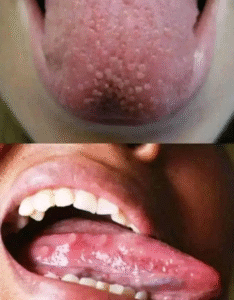If you have pimples or bumps on your tongue, your body may be trying to alert you to something important about your overall health. While often harmless, these bumps—commonly referred to as “lie bumps” or transient lingual papillitis—can sometimes indicate underlying issues ranging from minor irritations to more serious medical concerns. Understanding what these tongue bumps may mean can help you take appropriate action and better care of your health.
The surface of the tongue is covered with tiny projections called papillae, which help with taste and sensation. When these papillae become inflamed or irritated, they can swell and form painful, pimple-like bumps. While these are often temporary and benign, recurring or persistent bumps should not be ignored.
One of the most common causes of tongue pimples is irritation or trauma. Accidentally biting your tongue, eating very hot or spicy foods, or brushing too aggressively can all trigger inflammation. These types of bumps usually resolve on their own within a few days.
However, in some cases, these bumps can signal an underlying health issue. For example:
1. Nutritional Deficiencies:
A lack of essential vitamins—especially B-complex vitamins, iron, and folic acid—can lead to tongue irritation and swelling. Deficiencies may also cause a smooth, swollen, or burning tongue along with bumps. If your diet is lacking in key nutrients, your tongue could be one of the first places to show signs.
2. Allergic Reactions:
Food allergies or sensitivities to ingredients like preservatives, flavorings, or certain medications can trigger an immune response that causes the tongue to swell or develop bumps. In some cases, this may be accompanied by itching, a burning sensation, or even swelling of the lips and throat.
3. Infections:
Viral or bacterial infections can cause bumps or sores on the tongue. Herpes simplex virus, for example, can lead to painful oral lesions. Similarly, hand, foot, and mouth disease—a viral illness—often causes red bumps or blisters on the tongue, especially in children.
4. Oral Thrush:
A fungal infection caused by Candida yeast, oral thrush may appear as white patches on the tongue and inner cheeks. Underneath the patches, red, pimple-like bumps may form and cause discomfort. Thrush is more common in people with weakened immune systems, those taking antibiotics, or individuals with diabetes.
5. Stress or Hormonal Changes:
Emotional stress and hormonal fluctuations can trigger various changes in the body, including inflammation in the mouth and on the tongue. Some people notice bumps or soreness on the tongue during periods of high stress or hormonal changes such as pregnancy or menstruation.
6. Smoking and Tobacco Use:
Tobacco products, including cigarettes and chewing tobacco, can irritate the tongue and lead to persistent bumps or rough patches. Over time, chronic irritation from smoking may increase the risk of developing oral cancers.
7. Cancerous Lesions:
While rare, bumps or lumps on the tongue that persist for more than two weeks, do not heal, or are accompanied by other symptoms such as weight loss, difficulty swallowing, or bleeding, should be evaluated by a healthcare professional. These could be early signs of oral cancer.
8. Canker Sores:
Small, painful ulcers that appear on the tongue or inside the mouth, canker sores are not contagious and often heal within a week or two. However, their cause is still not fully understood and may involve stress, minor injuries, or immune system responses.
When to Seek Medical Attention:
- If the bumps last longer than two weeks
- If they are unusually painful, bleeding, or growing
- If they recur frequently
- If they are accompanied by fever, rash, or swollen lymph nodes
- If you have difficulty eating, speaking, or swallowing
To manage tongue pimples at home, consider the following:
- Avoid spicy, acidic, or very hot foods
- Rinse your mouth with warm salt water
- Maintain good oral hygiene with gentle brushing
- Avoid smoking and alcohol
- Stay hydrated and maintain a balanced diet
Ultimately, while a pimple on the tongue may seem minor, it could be your body’s way of drawing attention to a nutritional gap, an infection, or a more serious condition. Being aware of the potential causes and monitoring symptoms can help ensure that you respond appropriately and seek help when needed.


